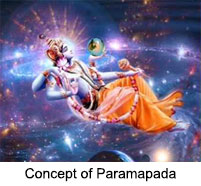 Concept of Paramapada is referred to in the "Pancharatra Samhitas" as the abode of Lord Vishnu. It is also known as "Vaikuntha Loka", which consists of beautiful castles with towers, halls with a thousand pillars, etc. It is also laid out with enchanting flower gardens, trees, streams, lakes etc. A scriptural text says: "In that mansion constructed with one thousand pillars, there lives the Lord of all the devatas". The Mahabharata, Vishnu Purana and other Vaishnava Puranas also contain references to the Paramapada. The hymns of Nammalvar describe vividly the way the individual souls soon after release from bondage are received with warm welcome by the celestial beings (God`s personal attendants) at the entrance of God"s mansion. Based on these ideas Ramanuja in his prose work named "Vaikuntha Gadya", gives a highly picturesque description of the Vaikuntha Loka. Following the same line of thought, Vedanta Desika also presents a graphic account of the ascent to the abode of God in his "Paramapada Sopana".
Concept of Paramapada is referred to in the "Pancharatra Samhitas" as the abode of Lord Vishnu. It is also known as "Vaikuntha Loka", which consists of beautiful castles with towers, halls with a thousand pillars, etc. It is also laid out with enchanting flower gardens, trees, streams, lakes etc. A scriptural text says: "In that mansion constructed with one thousand pillars, there lives the Lord of all the devatas". The Mahabharata, Vishnu Purana and other Vaishnava Puranas also contain references to the Paramapada. The hymns of Nammalvar describe vividly the way the individual souls soon after release from bondage are received with warm welcome by the celestial beings (God`s personal attendants) at the entrance of God"s mansion. Based on these ideas Ramanuja in his prose work named "Vaikuntha Gadya", gives a highly picturesque description of the Vaikuntha Loka. Following the same line of thought, Vedanta Desika also presents a graphic account of the ascent to the abode of God in his "Paramapada Sopana".
Nature of Paramapada
According to the Visistadvaita Vedanta, the ultimate Reality of Philosophy is a personal Supreme Being (Purusottama) which implies a concept of God with a body (yigraha). An impersonal God or an undifferentiated pure Being without any form (nirakara) does not serve the purpose of meditation and worship by the devotees. Besides, such a transcendental Being cannot have a relation to the universe and the individual souls. The yigraha or body assumed by the personal Supreme Being for the benefit of the universe and devotees should be of spiritual character as otherwise a body constituted of five elements is subject to constant change and decay. Further the individual souls (jivas) according to the Visistadvaita Vedanta are infinite in number and also eternal. Even in the state of Moksha, they do not lose their individuality and remain ever in their true form as omniscient, blissful, pure, spiritual monads enjoying full glory of God.
Besides the released souls, Visistadvaita admits on the authority of the scriptural texts the existence of a category of souls known as "Nityas" or those who are eternally free. These souls, like the permanent attendants of God perform divine service as part of their duty without any selfish motive. According to the Upanishads, the souls released from bondage can also assume bodies, if they so desire, to perform certain divine activities at the command of the Supreme Lord either in the higher regions or in the physical universe in the form of incarnated beings. Even the Supreme Being descends to the earth assuming the form of human or other living beings for the sole purpose of re-establishing dharma, to protect the sadhus and incidentally, punish the wicked persons. The bodies assumed by God during His incarnations cannot be considered material since they would be subject to destruction or decay. God is always a perfect Being untouched by birth, old age, death, karma and suffering as the Upanishads state.
Religious Significance of Paramapada
The religious significance of Paramapada stimulates a strong desire for the attainment of supreme spiritual goal (Moksha). Moksha in Visistadvaita is a positive concept. It refers not merely to the total liberation of a soul from bondage but it also leads to a blissful state of existence enjoying in full measure the glory of Brahman leading to the service to God. Bhakti or Prapatti is enjoined as the means to attain that state. In order to enable an individual to develop a desire for Moksha and promote the practice of Bhakti Yoga, the Vaishnava Acharyas seem to have presented a vivid descriptive account of the glory of God and His abode.
God in Vaishnavism is the Supreme Lord (Sarvesvara) endowed with jnana (omniscience), sakti (omnipotence), bala (strength) and many other attributes par excellence. If such a Supreme Being can create a wondrous physical universe of variegated character by mere sahkalpa or will without any other aid, He should be able to create by His very sahkalpa a spiritual universe with the best of all objects of pleasure for His own benefit.




















